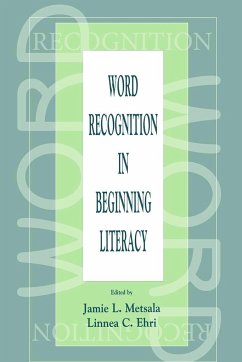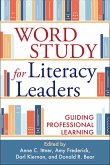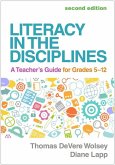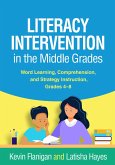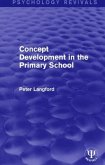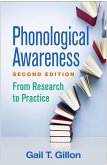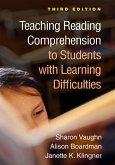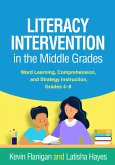Word Recognition in Beginning Literacy
Herausgeber: Metsala, Jamie L; Ehri, Linnea C
Word Recognition in Beginning Literacy
Herausgeber: Metsala, Jamie L; Ehri, Linnea C
- Broschiertes Buch
- Merkliste
- Auf die Merkliste
- Bewerten Bewerten
- Teilen
- Produkt teilen
- Produkterinnerung
- Produkterinnerung
This volume brings together reading and literacy experts from education and psychology in an examination of issues impacting early reading success and failure. For students and researchers in literacy and educators alike.
Andere Kunden interessierten sich auch für
![Word Study for Literacy Leaders Word Study for Literacy Leaders]() Word Study for Literacy Leaders56,99 €
Word Study for Literacy Leaders56,99 €![Literacy in the Disciplines Literacy in the Disciplines]() Thomas DeVere Wolsey (United Stat The American University in CairoLiteracy in the Disciplines49,99 €
Thomas DeVere Wolsey (United Stat The American University in CairoLiteracy in the Disciplines49,99 €![Literacy Intervention in the Middle Grades Literacy Intervention in the Middle Grades]() Kevin FlaniganLiteracy Intervention in the Middle Grades46,99 €
Kevin FlaniganLiteracy Intervention in the Middle Grades46,99 €![Concept Development in the Primary School Concept Development in the Primary School]() Peter LangfordConcept Development in the Primary School40,99 €
Peter LangfordConcept Development in the Primary School40,99 €![Phonological Awareness Phonological Awareness]() Gail T. Gillon (New Zealand University of Canterbury)Phonological Awareness52,99 €
Gail T. Gillon (New Zealand University of Canterbury)Phonological Awareness52,99 €![Teaching Reading Comprehension to Students with Learning Difficulties Teaching Reading Comprehension to Students with Learning Difficulties]() Sharon Vaughn (United States The University of Texas at Austin)Teaching Reading Comprehension to Students with Learning Difficulties71,99 €
Sharon Vaughn (United States The University of Texas at Austin)Teaching Reading Comprehension to Students with Learning Difficulties71,99 €![Literacy Intervention in the Middle Grades Literacy Intervention in the Middle Grades]() Kevin FlaniganLiteracy Intervention in the Middle Grades68,99 €
Kevin FlaniganLiteracy Intervention in the Middle Grades68,99 €-
-
-
This volume brings together reading and literacy experts from education and psychology in an examination of issues impacting early reading success and failure. For students and researchers in literacy and educators alike.
Hinweis: Dieser Artikel kann nur an eine deutsche Lieferadresse ausgeliefert werden.
Hinweis: Dieser Artikel kann nur an eine deutsche Lieferadresse ausgeliefert werden.
Produktdetails
- Produktdetails
- Verlag: Taylor & Francis Inc
- Seitenzahl: 414
- Erscheinungstermin: 1. April 1998
- Englisch
- Abmessung: 228mm x 151mm x 25mm
- Gewicht: 658g
- ISBN-13: 9780805828993
- ISBN-10: 0805828990
- Artikelnr.: 27307854
- Herstellerkennzeichnung
- Libri GmbH
- Europaallee 1
- 36244 Bad Hersfeld
- gpsr@libri.de
- Verlag: Taylor & Francis Inc
- Seitenzahl: 414
- Erscheinungstermin: 1. April 1998
- Englisch
- Abmessung: 228mm x 151mm x 25mm
- Gewicht: 658g
- ISBN-13: 9780805828993
- ISBN-10: 0805828990
- Artikelnr.: 27307854
- Herstellerkennzeichnung
- Libri GmbH
- Europaallee 1
- 36244 Bad Hersfeld
- gpsr@libri.de
Jamie L. Metsala, Linnea C. Ehri
Contents: Preface. Part I: Basic Processes in Beginning Word Recognition. L.C. Ehri
Grapheme-Phoneme Knowledge Is Essential for Learning to Read Words in English. U. Goswami
The Role of Analogies in the Development of Word Recognition. S.A. Stahl
B. Murray
Issues Involved in Defining Phonological Awareness and Its Relation to Early Reading. J.L. Metsala
A.C. Walley
Spoken Vocabulary Growth and the Segmental Restructuring of Lexical Representations: Precursors to Phonemic Awareness and Early Reading Ability. G.D.A. Brown
The Endpoint of Skilled Word Recognition: The ROAR Model. Part II: Processes and Instruction for Disabled Readers.L.S. Siegel
Phonological Processing Deficits and Reading Disabilities. J.K. Torgesen
S.R. Burgess
Consistency of Reading-Related Phonological Processes Throughout Early Childhood: Evidence From Longitudinal-Correlational and Instructional Studies. B.W. Wise
R.K. Olson
J. Ring
M. Johnson
Interactive Computer Support for Improving Phonological Skills. I.W. Gaskins
A Beginning Literacy Program for At-Risk and Delayed Readers. Part III: Word Recognition in Context.A.E. Cunningham
K.E. Stanovich
The Impact of Print Exposure on Word Recognition. L. Baker
S. Fernandez-Fein
D. Scher
H. Williams
Home Experiences Related to the Development of Word Recognition. R. Treiman
Why Spelling? The Benefits of Incorporating Spelling Into Beginning Reading Instruction. R. Calfee
Phonics and Phonemes: Learning to Decode and Spell in a Literature-Based Program. D.H. Tracey
L.M. Morrow
Motivating Contexts for Young Children's Literacy Development: Implications for Word Recognition. M. Pressley
R. Wharton-McDonald
J. Mistretta
Effective Beginning Literacy Instruction: Dialectial
Scaffolded
and Contextualized.
Grapheme-Phoneme Knowledge Is Essential for Learning to Read Words in English. U. Goswami
The Role of Analogies in the Development of Word Recognition. S.A. Stahl
B. Murray
Issues Involved in Defining Phonological Awareness and Its Relation to Early Reading. J.L. Metsala
A.C. Walley
Spoken Vocabulary Growth and the Segmental Restructuring of Lexical Representations: Precursors to Phonemic Awareness and Early Reading Ability. G.D.A. Brown
The Endpoint of Skilled Word Recognition: The ROAR Model. Part II: Processes and Instruction for Disabled Readers.L.S. Siegel
Phonological Processing Deficits and Reading Disabilities. J.K. Torgesen
S.R. Burgess
Consistency of Reading-Related Phonological Processes Throughout Early Childhood: Evidence From Longitudinal-Correlational and Instructional Studies. B.W. Wise
R.K. Olson
J. Ring
M. Johnson
Interactive Computer Support for Improving Phonological Skills. I.W. Gaskins
A Beginning Literacy Program for At-Risk and Delayed Readers. Part III: Word Recognition in Context.A.E. Cunningham
K.E. Stanovich
The Impact of Print Exposure on Word Recognition. L. Baker
S. Fernandez-Fein
D. Scher
H. Williams
Home Experiences Related to the Development of Word Recognition. R. Treiman
Why Spelling? The Benefits of Incorporating Spelling Into Beginning Reading Instruction. R. Calfee
Phonics and Phonemes: Learning to Decode and Spell in a Literature-Based Program. D.H. Tracey
L.M. Morrow
Motivating Contexts for Young Children's Literacy Development: Implications for Word Recognition. M. Pressley
R. Wharton-McDonald
J. Mistretta
Effective Beginning Literacy Instruction: Dialectial
Scaffolded
and Contextualized.
Contents: Preface. Part I: Basic Processes in Beginning Word Recognition. L.C. Ehri
Grapheme-Phoneme Knowledge Is Essential for Learning to Read Words in English. U. Goswami
The Role of Analogies in the Development of Word Recognition. S.A. Stahl
B. Murray
Issues Involved in Defining Phonological Awareness and Its Relation to Early Reading. J.L. Metsala
A.C. Walley
Spoken Vocabulary Growth and the Segmental Restructuring of Lexical Representations: Precursors to Phonemic Awareness and Early Reading Ability. G.D.A. Brown
The Endpoint of Skilled Word Recognition: The ROAR Model. Part II: Processes and Instruction for Disabled Readers.L.S. Siegel
Phonological Processing Deficits and Reading Disabilities. J.K. Torgesen
S.R. Burgess
Consistency of Reading-Related Phonological Processes Throughout Early Childhood: Evidence From Longitudinal-Correlational and Instructional Studies. B.W. Wise
R.K. Olson
J. Ring
M. Johnson
Interactive Computer Support for Improving Phonological Skills. I.W. Gaskins
A Beginning Literacy Program for At-Risk and Delayed Readers. Part III: Word Recognition in Context.A.E. Cunningham
K.E. Stanovich
The Impact of Print Exposure on Word Recognition. L. Baker
S. Fernandez-Fein
D. Scher
H. Williams
Home Experiences Related to the Development of Word Recognition. R. Treiman
Why Spelling? The Benefits of Incorporating Spelling Into Beginning Reading Instruction. R. Calfee
Phonics and Phonemes: Learning to Decode and Spell in a Literature-Based Program. D.H. Tracey
L.M. Morrow
Motivating Contexts for Young Children's Literacy Development: Implications for Word Recognition. M. Pressley
R. Wharton-McDonald
J. Mistretta
Effective Beginning Literacy Instruction: Dialectial
Scaffolded
and Contextualized.
Grapheme-Phoneme Knowledge Is Essential for Learning to Read Words in English. U. Goswami
The Role of Analogies in the Development of Word Recognition. S.A. Stahl
B. Murray
Issues Involved in Defining Phonological Awareness and Its Relation to Early Reading. J.L. Metsala
A.C. Walley
Spoken Vocabulary Growth and the Segmental Restructuring of Lexical Representations: Precursors to Phonemic Awareness and Early Reading Ability. G.D.A. Brown
The Endpoint of Skilled Word Recognition: The ROAR Model. Part II: Processes and Instruction for Disabled Readers.L.S. Siegel
Phonological Processing Deficits and Reading Disabilities. J.K. Torgesen
S.R. Burgess
Consistency of Reading-Related Phonological Processes Throughout Early Childhood: Evidence From Longitudinal-Correlational and Instructional Studies. B.W. Wise
R.K. Olson
J. Ring
M. Johnson
Interactive Computer Support for Improving Phonological Skills. I.W. Gaskins
A Beginning Literacy Program for At-Risk and Delayed Readers. Part III: Word Recognition in Context.A.E. Cunningham
K.E. Stanovich
The Impact of Print Exposure on Word Recognition. L. Baker
S. Fernandez-Fein
D. Scher
H. Williams
Home Experiences Related to the Development of Word Recognition. R. Treiman
Why Spelling? The Benefits of Incorporating Spelling Into Beginning Reading Instruction. R. Calfee
Phonics and Phonemes: Learning to Decode and Spell in a Literature-Based Program. D.H. Tracey
L.M. Morrow
Motivating Contexts for Young Children's Literacy Development: Implications for Word Recognition. M. Pressley
R. Wharton-McDonald
J. Mistretta
Effective Beginning Literacy Instruction: Dialectial
Scaffolded
and Contextualized.

